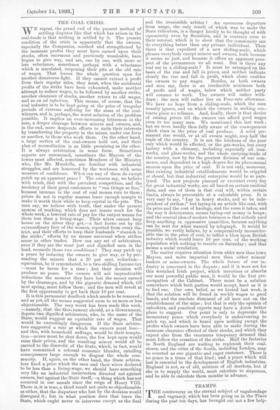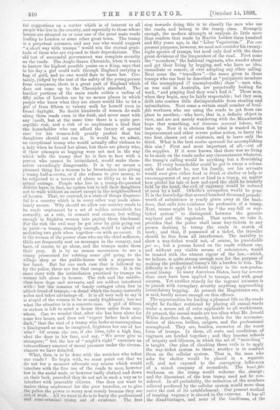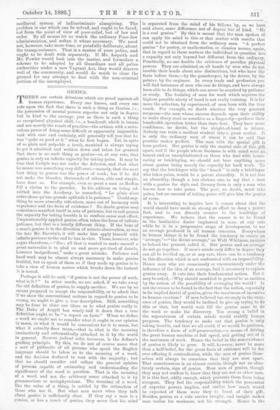TRAMPS. T HE controversy on the eternal subject of vagabondage and
vagrancy, which has been going on in the Times during the past ten days, has brought out not a few help- ful suggestions on a matter which is of interest to all people who live in the country, and especially to those whose houses are situated on or near one of the great main roads leading to London or some other great town. The tramp is a perpetual nuisance, and any one who would suggest " a short way with tramps " would win the eternal grati- tude of those who are exposed to their depredations. The old test of successful government was complete security on the roads. The Anglo-Saxon Chronicle, when it wants to bestow the highest possible praise on a King, says that in his day a girl could walk through England carrying a bag of gold, and no one would dare to harm her. Cer- tainly, judged by the test of the safety of the young person from annoyance, there is a great part of England which does not come up to the Chronicle's standard. The lonelier portions of the main roads within a radius of fifty miles of London are by no means places in which people who know what they are about would like to let a girl of from fifteen to twenty walk by herself even in broad daylight. No doubt hundreds of women do walk along these roads even in the dusk, and never meet with any insult, but at the same time there is a quite per- ceptible risk, and a risk of so unpleasant a kind that the householder who can afford the luxury of special care for his women-folk greatly prefers that his daughters should not run it. It would be, we admit, an exceptional tramp who would actually offer violence to a lady when he found her alone, but there are plenty who, if their attempts at begging were not met in the way which tells the tramp that he is face to face with a person who cannot be intimidated, would make them- selves exceedingly disagreeable. It is by no means a pleasant thing for a woman to be browbeaten into giving a tramp half-a-crown, or if she refuses to give money, to be subjected to a torrent of abuse so filthy as to be an actual outrage. People who live in a tram-frequented district have, in fact, no option but to tell their daughters not to walk without an escort except in the neighbourhood of houses. That, we contend, is a state of things disgrace- ful to a country which is in every other way made abso- lutely secure. Why should we allow our country roads to be made unpleasant by a set of sodden scoundrels too cowardly, as a rule, to commit real crimes, but willing enough to frighten women into paying them blackmail. For the rich the evil may be got over by girls going out in pairs—a tramp, strangely enough, would be afraid of molesting two girls when together—or with an escort. It is the women of the poorer class who are the chief sufferers. Girls are frequently sent on messages in the country, and have, of course, to go alone, and the tramps make them their prey, It is by no means uncommon to see • a tramp prosecuted for robbing some girl going to the village shop or the public-house with a sixpence in her hand. But for one such case that is followed up by the police, there are ten that escape notice. It is the same story with the intimidation practised by tramps on women left alone in houses. The rich and the middle- class have dogs and servants, and are seldom interfered with ; but the inmates of lonely cottages often live in abject dread of tram ps,—a dread Which the tramp instantly notes and takes advantage of. It is all very well to say it is stupid of the women to be so easily frightened ; but see what the situation is in a concrete case. A girl of fifteen or sixteen is left to mind a house three miles from any- where. Can we wonder that, after she has been alone for some five hours, and does not "expect father back afore dark," that the visit of a tramp who looks as unscrupulous a blackguard as can be imagined, frightens her out of her wits ? Of course she can, if she likes, take a high line, shut the door in his face, and say, " We never give to strangers ; " but the law of "might's right" exercises an extraordinary amount of moral pressure under the circum- stances we have detailed.
What, then, is to be done with the wretches who infest our roads ? To begin with, we must point out that we do not for a moment advocate any course which would interfere with the free use of the roads to men, however low in the social scale, or however badly clothed and down on their luck, provided they do not act in such a way as to interfere with peaceable citizens. One does not want to makes thing unpleasant for the poor traveller, or to give the police the power to worry men merely because they are out of work. All we want to do is to harry the professional and semi-criminal tramp out of existence. The first step towards doing this is to classify the men who use the roads, and belong to the tramp class. Strangely enough, the modern attempts at analysis do little more than confirm that made by Martin Luther three hundred and fifty years ago, in the " Liber Vagatorum." For our present purposes, however, we need not consider his twenty- eight species of tramps, but need only deal with the three great divisions of the frequenters of the road. First come the " mouchers," the habitual vagrants, who wander about and get their living by begging, and who have no idea, immediate or remote, of ever adopting any other calling. Next come the "travellers "—the name given to those tramps who can best be described as " peripatetic members of the unemployed (? unemployable) class "—men who, as was said in Australia, are perpetually looking for work, " and praying God they won't find it." These men, when they begin, may be fairly respectable ; but they soon drift into courses little distinguishable from stealing and intimidation. Next come a certain small number of bond. fide workmen who are using the roads to get from one place to another,—who have, that is, a definite object in view, and are not merely wandering with the Micawberish hope that something, not tiresome manual labour, will turn up. Now it is obvious that what is wanted is, by imprisonment and other severe police action, to harry the two first classes out of existence, and to leave only the third. What is the best modus operandi for accomplishing this aim ? First and most important of all,—cut off the supplies. If it were known that there was no living to be made on the roads under any circumstances whatever, the tramp's calling would be anything but a flourishing one. If every householder could be got to swear a solemn oath that neither he, nor his family, nor his servants would ever give either food or drink or shelter or help or encouragement of any sort or kind to a tramp, no matter how pitiful his tale or how sad-eyed the child he tenderly held by the hand, the evil of vagrancy would be reduced at once by a half. Othello's occupation would be gone. It is the knowledge that several hundred thousand pounds'- worth of subsistence is yearly given away at the back- door, that calls into existence the profession of a tramp. Next, means might be taken by " the way-bill or way- ticket system " to distinguish between the genuine wayfarer and the vagabond. That system, we take it, provides that the police shall issue way-tickets to any person desiring to tramp the roads in search of work ; and that, if possessed of a ticket, the traveller should be free from all interference. The inability to show a way-ticket would not, of course, be punishable per se; but a person found on the roads without one, and without any visible means of subsistence, would be treated with the utmost rigour of the law,—which, we believe, is quite strong enough now for the purpose of making the professional tramp's life a burden to him. The difficulty is to apply it without injury to the non-profes- sional tramp. In many American States, laws far severer than ours have been applied to tramps, and with great success. Yet another remedy for the vagrant nuisance is to punish with exemplary severity anything approaching intimidatory begging. At present the Magistrates are, it is said, hardly severe enough on this offence. The opportunities for leading a pleasant life on the roads might be further restricted by placing all casual-wards under a severe set of rules applicable to all workhouses. At present, the casual-wards are too often what Mr. Arnold White describes them, namely, hotels for the accommo- dation of thieves, bullies, cadgers, and the professional unemployed. They are, besides, nurseries of the worst form of tramps. In them, all sorts and conditions of vagrants are herded together ; and they become schools of iniquity and idleness, in which the art of " mouching " is taught. One plan of checking these evils is to apply the way-ticket system to them ; another is to conduct them on the cellular system. That is, the man who asks for shelter would be placed in a separate cell, and not exposed to the corrupting influences of a mixed company of scoundrels. The bond-pie workman on the tramp would welcome the change ; and the 'discontent of the true tramp need not be con- sidered. In all probability, the reduction of the numbers relieved produced by the cellular system would more than cover the cost of its establishment. Our present method of treating vagrancy is absurd in the extreme. It has all the disadvantages, and none of the kindliness, of the mediaeval system of indiscriminate almsgiving. The problem is one which can be solved, and ought to be faced, not from the point of view of poor-relief, but of law and order. By all means let us watch the ordinary Poor-law administration, and soften it where necessary. We need not, however, take more time, or painfully deliberate, about the tramp-nuisance. That is a matter of pure police, and ought to be dealt with separately. If Mr. Asquith and Mr. Fowler would. look into the matter, and formulate a scheme to be adopted by all Guardians and all police authorities under a new Vagrant Act, they would deserve well of the community, and would do much to clear the ground for any attempt to deal with the non-criminal portion of the unemployed.




















































 Previous page
Previous page